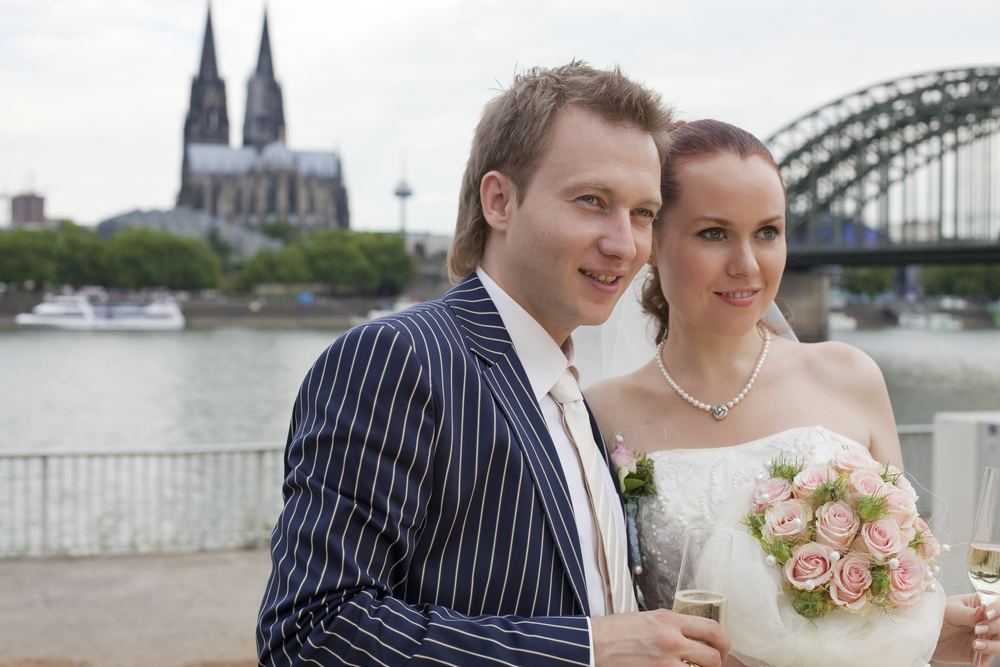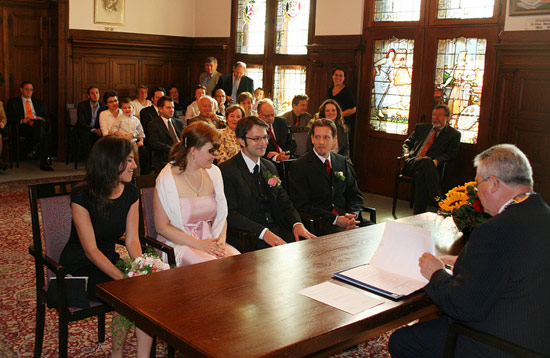Life Stages: Marriage
Modern Trends
Marriage as a social institution has become less relevant in Germany in the past few decades. Non-marital living partnerships increased at the end of the 20th century and into the 21st, and the number of marriages taking place in Germany has declined. The rising number of out-of-wedlock births also serves to indicate the movement away from the traditional concepts of marriage and family.
The minimum legal age for marriage in Germany is 18 for men and women, though some may marry as early as 16, in special cases. Most Germans prefer to develop their careers and have a steady income before they wed, so most marry in their late 20s or early 30s. No familial hierarchy exists to determine which sibling marries first.
A traditional German wedding lasts three days. First comes the civil ceremony, then the big wedding party with friends, neighbors and acquaintances. The religious ceremony takes place on the third day.
All German marriages require a civil ceremony, and couples may choose to have only a civil ceremony. If that case, they may or may not choose to have a party or reception afterward.
Religious Option
A religious ceremony remains purely optional. In cases where the couple decides to have a religious as well as a civil ceremony, only family and close friends attend the civil ceremony at the registry office or Standesamt, and they do this prior to the religious ceremony. Normally, people hold a party on the day between the civil ceremony and the religious ceremony. According to an old German wedding tradition, guests bring old dishes to break, and the bridal couple sweep up the broken pieces together. Their action implies that nothing will ever be broken in their house again and symbolizes that their marriage will prove harmonious.
For a wedding in a church, flower girls usually accompany German brides, who have no adult attendants. When the couple kneels during the vows, the groom may kneel on his bride’s wedding dress to show that he will take the lead in their relationship, and when they stand, the bride steps on her groom's foot to show otherwise.
A wedding reception usually follows the religious service. In an old custom that Germans sometimes still observe, the groom’s main attendant, the best man, steals the bride and takes her to a local pub where they drink champagne until the groom finds them. The groom must pay for all they drank before he can claim his bride. Later, friends and relatives of the couple barricade all the exits at the reception hall with ribbons and garlands and extract a toll from the couple—usually the promise of another party—before they permit the couple to leave on their honeymoon. Another custom involves friends and family creating a wedding newspaper or booklet full of pictures, articles and stories of the engaged couple, then selling it at the wedding reception to raise funds to meet the expenses of the honeymoon.
Men and women tend to be equal partners in marriage in terms of decision-making power. Women are equally likely to hold full-time jobs and earn a substantial portion of the family income. German women, however, remain overwhelmingly responsible for household tasks and care of any children.
Parents typically have no say in their children’s choice of spouse. Married couples live in apartments or single-family homes and rarely share a residence with parents. Couples in rural areas may live with the groom’s parents, particularly if the groom works his parents’ family farm.
Extramarital affairs do occur in Germany, and although the culture widely acknowledges that such affairs happen, the affairs remain culturally unacceptable. Infidelity continues as a major cause for divorce in Germany, with most women and men agreeing that fidelity serves as the most important of values in a relationship. Paradoxically, the same proportion of men and women admitted the near impossibility of remaining faithful to the same person for a lifetime.
Germany does not permit polygamous unions, but it recognizes polygamous marriages contracted in a foreign country honoring such unions. Women living in Germany, in a polygamous marriage that a foreign country has validated, can claim spousal support in German courts.
The law grants equal rights to men and women in matters relating to marriage and family: both have the same right to enter into a marriage; the same rights and responsibilities during marriage and after dissolution; the same rights to birth control; and, the same rights regarding ownership, administration, and disposition of property.
Couples celebrate wedding anniversaries, particularly in West Germany, with special meals and little gifts. An important anniversary, such as the 50th, may be an occasion for a family party.
About half of German marriages end in divorce. The German law allows divorce if the marriage has irretrievably broken down; it does not require the fault of a spouse as ground for divorce, nor does it penalize either spouse on the basis of a fault.
In divorce, parents who have joint care of their child continue to care jointly for the child unless the arrangement endangers the welfare of the child, in which case the court decides, on the basis of the child’s best interests, which parent deserves sole parental care.
Men and women can remarry at will, and widows commonly do so without any social implications.
Same-Sex Marriage
Germany recognizes same-sex marriage. Germany passed a law allowing same-sex couples to marry in 2017, and the first same-sex marriages in the country took place on October 1, 2017. Same-sex marriage in Germany is treated in the same way as opposite-sex marriage, and same-sex couples have the same rights and responsibilities as married opposite-sex couples, including the right to adopt children.
It's worth noting that prior to the legalization of same-sex marriage in Germany, same-sex couples were able to enter into registered partnerships, which granted many of the same rights and responsibilities as marriage but did not allow them to marry in a religious ceremony or adopt children.
Copyright © 1993—2025 World Trade Press. All rights reserved.

 Germany
Germany 

